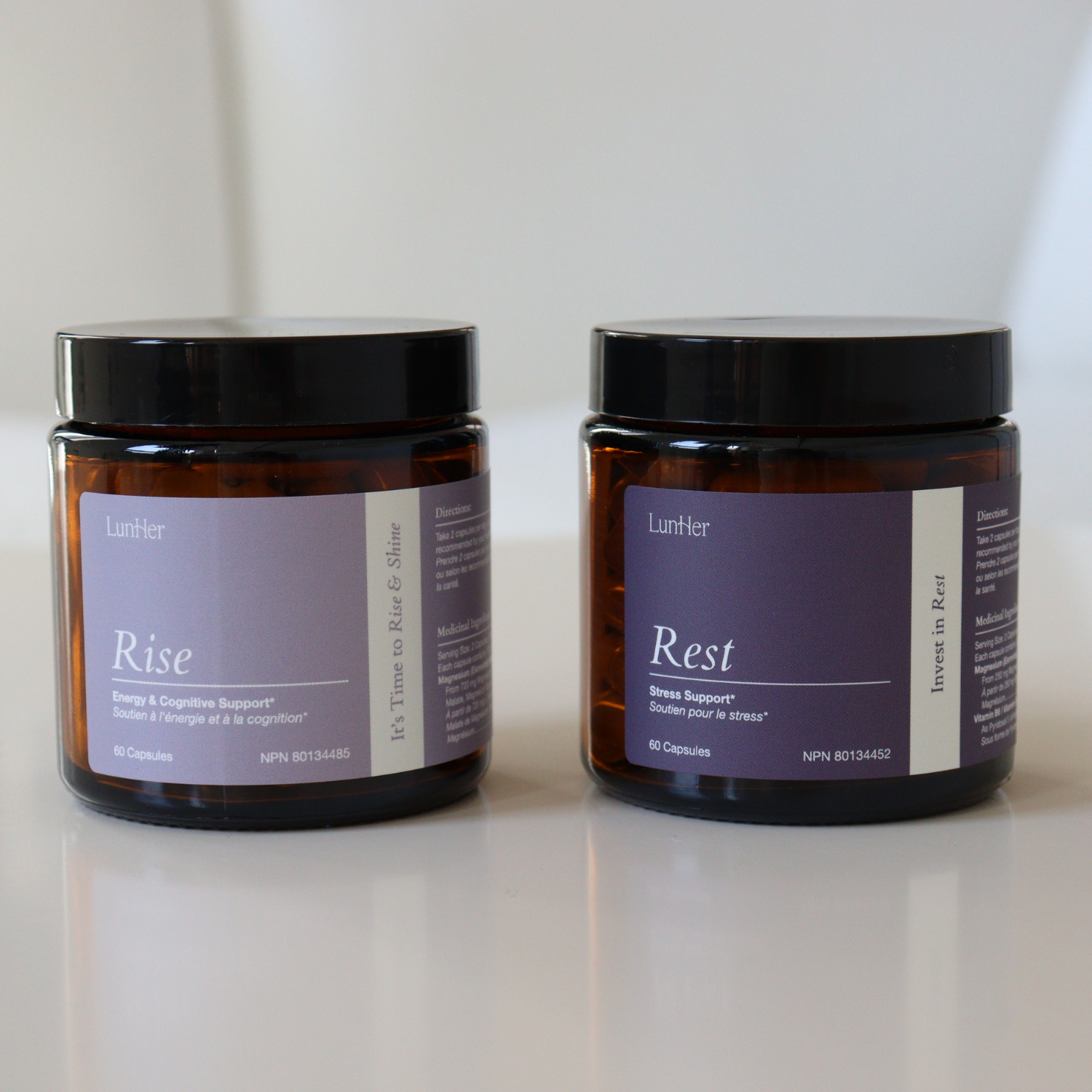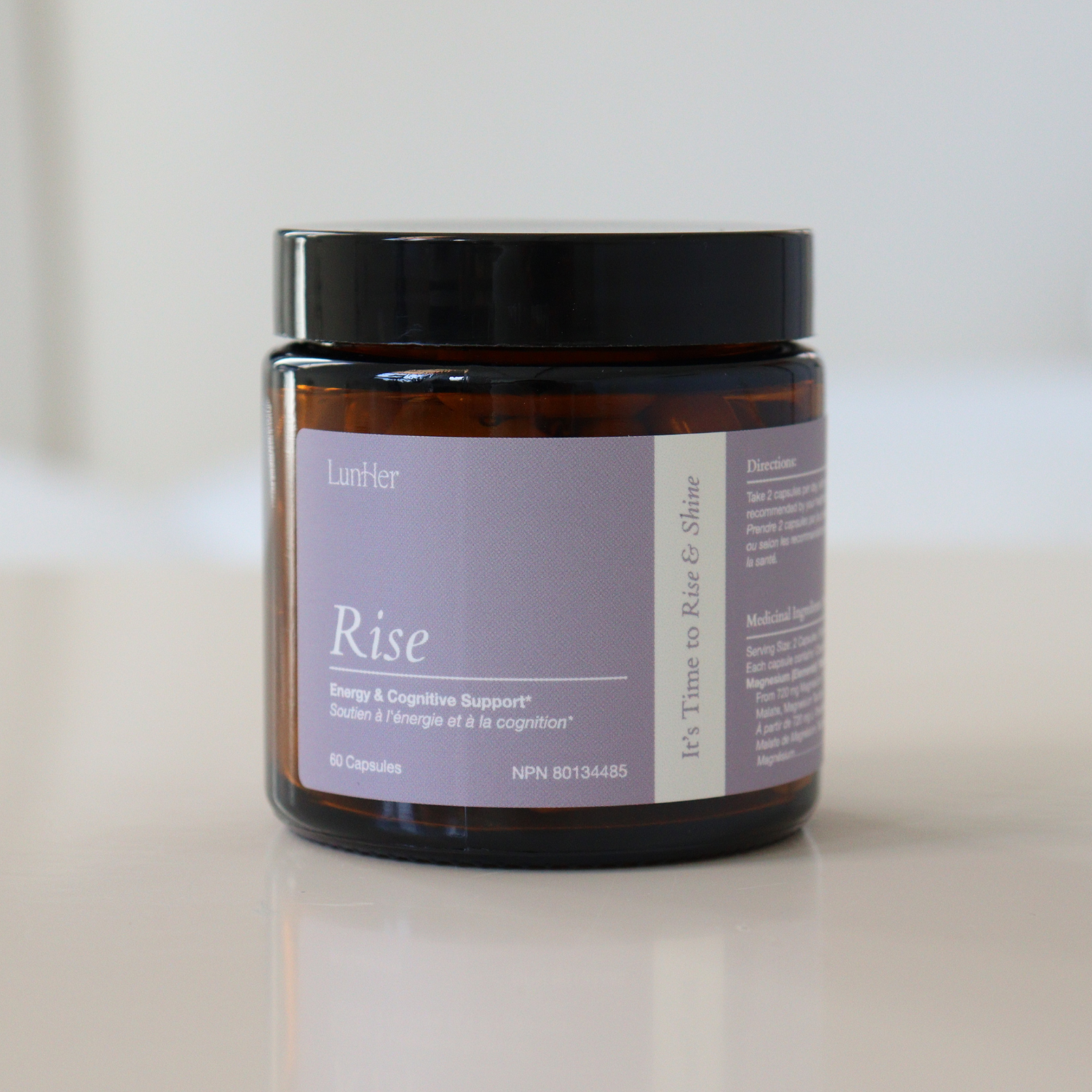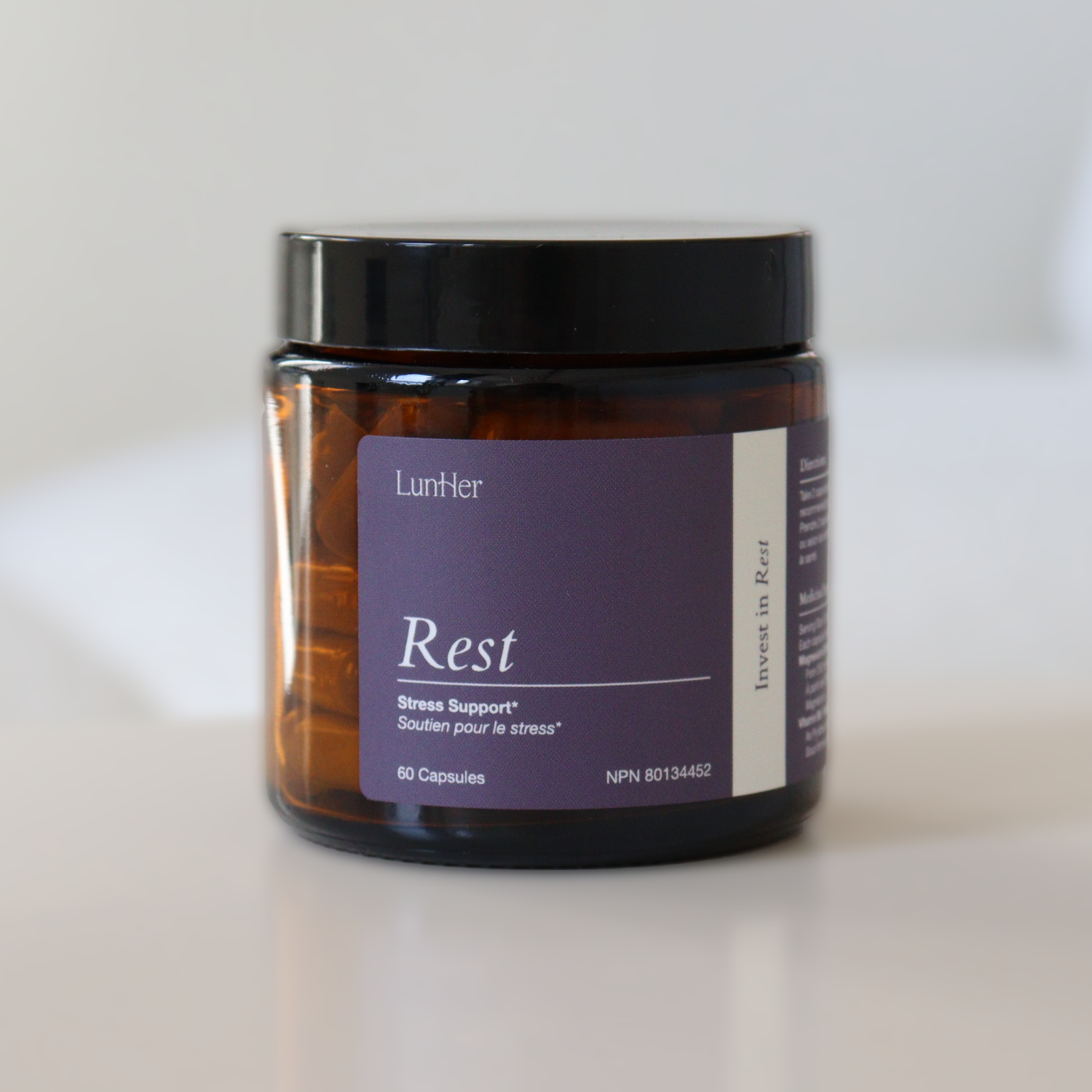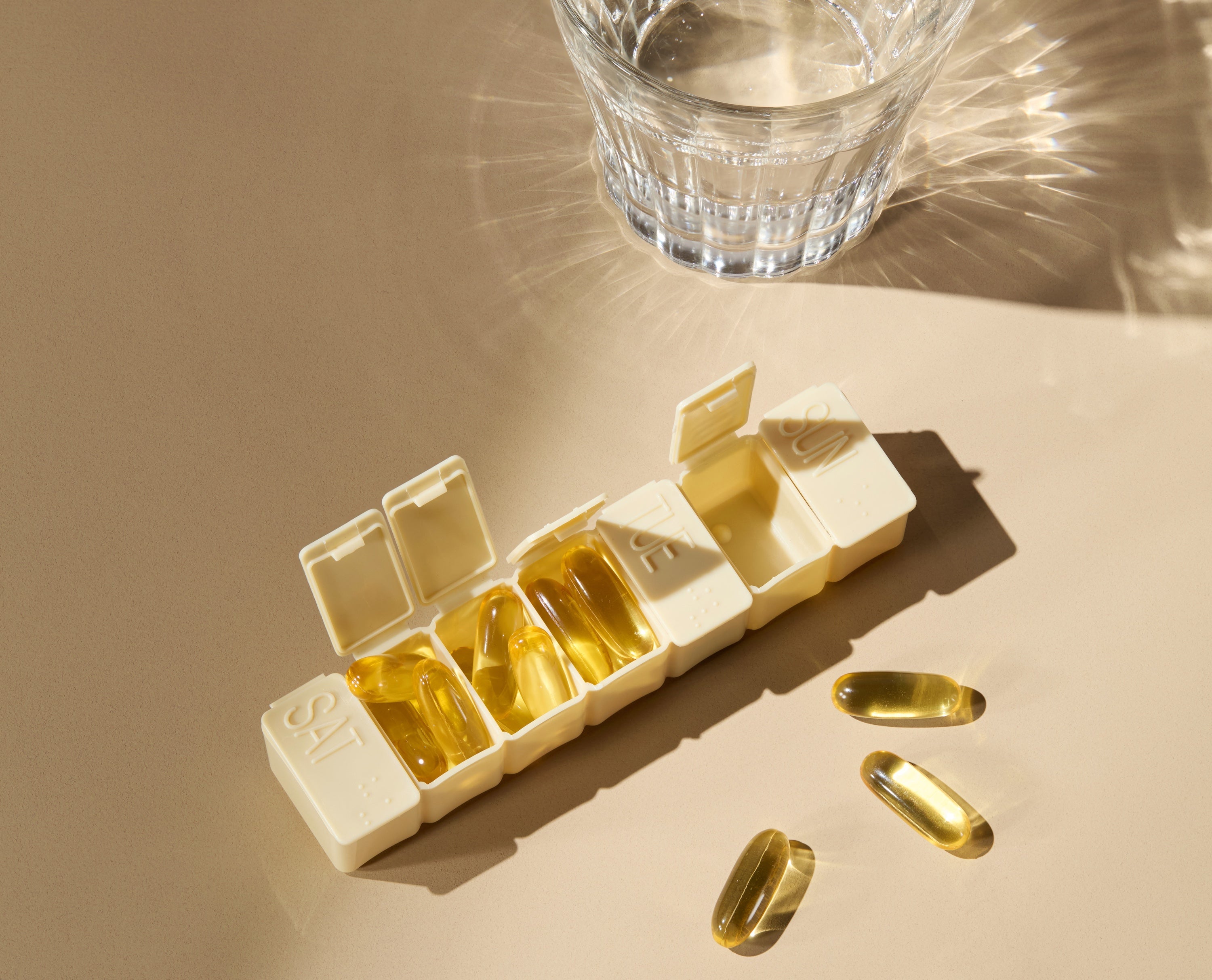
9 Supplements That May Help Adrenal Fatigue
Between work, family, fertility or hormone journeys, and everything in between, you might find yourself feeling drained, foggy, and just off. During periods of high stress, your adrenal glands can be overworked, leading to adrenal fatigue.
Let’s dive into what adrenal fatigue means and explore some supportive supplements and lifestyle shifts that can help restore your balance from the inside out.
The LunHer Take
Your adrenal glands play a huge role in how your body responds to stress, regulates metabolism, supports your immune system, and keeps your blood pressure in check.
When your adrenal glands are overwhelmed by chronic stress, they can’t produce enough vital hormones.
Taking supplements may help reduce stress, which will take stress off of your adrenal glands.
Lifestyle changes and stress management are also extremely helpful when it comes to adrenal fatigue.
What are the adrenal glands?
Your adrenal glands are two small but mighty hormone-producing powerhouses that sit on top of your kidneys. They’re part of your endocrine system, and they play a huge role in how your body responds to stress, regulates metabolism, supports your immune system, and keeps your blood pressure in check.
Each adrenal gland has two parts: the cortex and the medulla. Each is responsible for producing different hormones. When your adrenal glands fail to function properly, you may experience some health issues, including what’s known as adrenal fatigue.
Adrenal glands and stress
Your adrenal glands release hormones right into your bloodstream and many of the hormones they produce are connected to the body’s response to various stressors. These stressors can be physical, biochemical, hormonal, emotional, mental, etc.
One of the hormones that your adrenal glands produce is cortisol, which is often referred to as the “stress hormone.” Cortisol serves many important functions for your health and has effects on the immune system, the nervous system, the cardiovascular system, and more. It gets its nickname from the way it manages your body’s response to stress and if cortisol levels remain too high for too long, that can cause issues.
What is adrenal fatigue?
While not a formal medical diagnosis, adrenal fatigue is a term used to describe a set of symptoms that show up when your adrenal glands aren’t producing enough of these vitally important hormones. The theory is that chronic stress can overstimulate the adrenal glands until they can’t keep up with hormone production, especially cortisol. There is still more research needed on this subject but many women have found this description relatable.
Signs You Might Be Experiencing Adrenal Fatigue
The fact that adrenal fatigue isn’t an official condition doesn’t mean the symptoms you’re experiencing aren’t very real. Here are some of the symptoms you may experience:
-
Brain fog
-
Fatigue
-
Difficulty waking up or falling asleep
-
Sugar cravings
-
Salt cravings
-
Decreased motivation
Depending on the severity of the adrenal fatigue, it can take months – or even up to two years – to restore proper balance. It’s always important to talk to your healthcare provider if you’re dealing with ongoing symptoms.
9 Supplements That May Support Adrenal Health & Energy
Here’s a breakdown of some vitamins and supplements that can support the health of your adrenal glands. Keep in mind that everyone’s body is different and these aren’t guaranteed solutions.
1. Magnesium
This one’s non-negotiable. Magnesium deficiencies can negatively affect energy and sleep regularity, and they can lead to more headaches. Furthermore, magnesium has been shown to have a calming effect on the nervous system. This study, as one example, found that long-term magnesium supplementation helped lower stress levels for people who had been experiencing mental and physical stress.
2. B-vitamins
B vitamins perform many important functions in the body. They support proper neurological functioning, red blood cell formation, and the synthesis of DNA and RNA. They can also support energy metabolism in the nervous system. Importantly, they can also help regulate cortisol levels. For example, vitamins B6, B12, and folic acid all promote the production of GABA, which is a neurotransmitter that manages cortisol levels.
3. Vitamin D
Vitamin D is essential for immune function, hormone balance, and stress regulation. Studies suggest that vitamin D supplementation can reduce cortisol levels, which may be beneficial for the adrenal glands. Despite its importance, vitamin D deficiency is surprisingly common – and such a deficiency can lead to heightened cortisol levels.
4. Holy basil
Holy basil is another adaptogen, and studies have shown it can help manage stress levels. One study found that it managed stress levels by reducing cortisol levels. Another study found that it may block the release of cortisol. It may also promote immune function.
5. Vitamin C
Vitamin C, which is also known as ascorbic acid, is great for adrenal support. Your adrenal glands store vitamin C, and they need it to produce cortisol in a regulated, healthy way. When your adrenal glands don’t have enough vitamin C, they actually try to create even more cortisol. Studies show that depleted vitamin C levels can be associated with adrenal degeneration.
6. Vitamin E
Vitamin E is a fat-soluble vitamin with antioxidant properties. Its antioxidant properties help the body manage oxidative stress. This bodes well for vitamin E’s potential helpfulness in addressing adrenal fatigue, since adrenal fatigue may be connected to issues with adequate antioxidant levels.
7. Calcium
Calcium is the most abundant mineral in the body, and it’s vitally important for bone health. It also plays a supporting role in buffering the effects of stress on your nervous system. Think of it as an internal shock absorber that helps soften the blow of daily stress.
8. Rhodiola rosea
Rhodiola rosea is a gentle adaptogen that helps your body respond to occasional stressors. It boasts a number of health benefits including supporting endurance and recovery after exercise, supporting mood, promoting mental energy and, acting as a buffer to stress-related mental and physical fatigue. Its stress-relieving properties may have a positive effect on the health of the adrenal glands.
9. Ashwagandha
Commonly known as “Indian Ginseng,” ashwagandha has for centuries been part of the Indian practice of Ayurvedic medicine. It’s been shown to relieve occasional stress and also reduce cortisol levels. One study found that those who consumed the ashwagandha extract saw reduced cortisol levels and a 44% improvement in mental health compared to the placebo group. By managing cortisol levels, ashwagandha may help alleviate adrenal fatigue.
Other Ways to Support Your Adrenal Glands
In addition to trying the supplements listed above, there are some lifestyle adjustments you can make that may combat adrenal fatigue – mainly through reducing stress.
Some lifestyle habits that can make a big difference:
-
Prioritize getting 7-9 hours of sleep each night
-
Eat nutrient-dense meals at regular intervals
-
Practice daily stress-relief (ex. Breathwork, meditation, journaling)
-
Cut back on stimulants such as caffeine
-
Make sure you’re staying hydrated
The Bottom Line
Adrenal fatigue may not be a textbook diagnosis but the feelings of burnout, low energy, and hormonal imbalance it describes are very real. Taking supplements may help reduce and alleviate your symptoms but there are also lifestyle changes that you can make.





